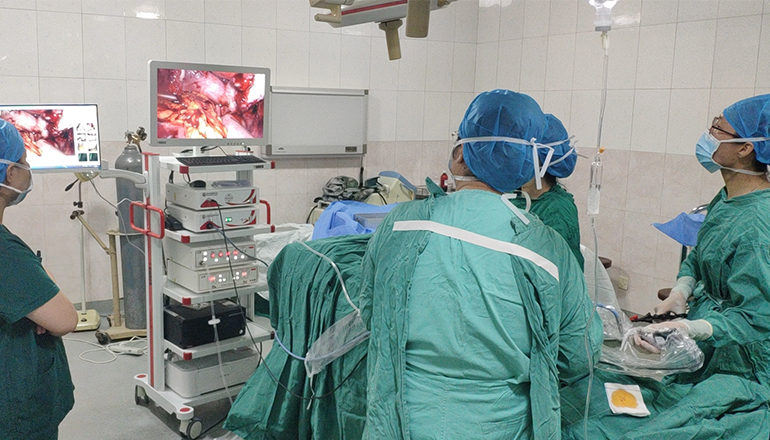- Shanghai, China
- [email protected]
- +86-21-58189111
Laparoscopic interstitial pregnancy operation of the fallopian tube is a minimally invasive surgical procedure used to treat interstitial ectopic pregnancy. An interstitial ectopic pregnancy occurs when a fertilized egg implants in the interstitial portion of the fallopian tube, which is the part that passes through the uterine wall. This type of ectopic pregnancy can be life-threatening if left untreated and requires immediate medical attention.
The laparoscopic interstitial pregnancy operation is performed under general anesthesia and involves making several small incisions in the abdomen to insert a laparoscope, which is a thin, flexible tube with a camera and light on the end. The surgeon uses the camera to guide the laparoscope to the fallopian tube, where they can visualize the interstitial pregnancy.
During the procedure, the surgeon will carefully remove the interstitial pregnancy while preserving as much of the fallopian tube as possible. If the fallopian tube is severely damaged or ruptured, it may need to be removed completely. In some cases, the surgeon may need to perform a salpingectomy, which is the removal of the entire fallopian tube.
Laparoscopic interstitial pregnancy operation is a safe and effective procedure with a low risk of complications. It is often performed as an outpatient procedure, which means that the patient can go home the same day. After the surgery, patients may experience some pain and discomfort, which can be managed with pain medications. They may also need to take antibiotics to prevent infection.

Recovery time after laparoscopic interstitial pregnancy operation varies from person to person but is typically shorter than with traditional open surgery. Most patients are able to return to their normal activities within a few days to a week. It is important to follow the surgeon's post-operative instructions carefully to ensure proper healing and prevent complications.
In conclusion, laparoscopic interstitial pregnancy operation is a minimally invasive surgical procedure used to treat interstitial ectopic pregnancy of the fallopian tube. It is a safe and effective option for treating this condition, with a low risk of complications and a shorter recovery time compared to traditional open surgery. If you are experiencing symptoms of an interstitial ectopic pregnancy, such as abdominal pain or vaginal bleeding, it is important to seek medical attention as soon as possible to prevent complications and ensure the best possible outcome. Your doctor can help you determine the best course of treatment for your individual case.
It is important to note that laparoscopic interstitial pregnancy operation may not be appropriate for all cases of interstitial ectopic pregnancy. The decision to perform this procedure will depend on the size and location of the pregnancy, as well as the overall health and medical history of the patient. In some cases, traditional open surgery may be necessary to treat the condition.
After the surgery, patients should continue to follow up with their healthcare provider to monitor their recovery and ensure that there are no complications. They should also discuss with their provider any plans for future pregnancies, as interstitial ectopic pregnancy may increase the risk of future ectopic pregnancies.
In summary, laparoscopic interstitial pregnancy operation of the fallopian tube is a safe and effective option for treating interstitial ectopic pregnancy. It is a minimally invasive procedure with a low risk of complications and a shorter recovery time compared to traditional open surgery. If you are experiencing symptoms of interstitial ectopic pregnancy, it is important to seek medical attention as soon as possible to prevent complications and ensure the best possible outcome. Your doctor can help you determine the best course of treatment for your individual case.
Leave a Comments